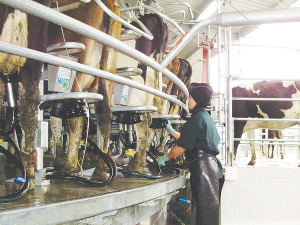Once-a-day milking (OAD) can increase or lower the amounts of proteins in milk, according to a new study published in the journal Dairy.
The study was conducted by Riddet Institute PhD student Marit van der Zeijden as part of her PhD looking at the comparison between OAD milking and twice-a-day (TAD) milking.
The study found significant differences in the proportion of some proteins, depending on the milking system used.
"Milk from a OAD milking system contained higher proportions of as2 casein and k-casein and lower proportions of a-lactal-bumin," says van der Zeijden.
She says this could have implications for milk processing and quality, as gelation and heating properties are impacted by these proteins.
Van der Zeijden says this was the first study to look at protein composition across the whole milking season, rather than a single sample. Most similar studies also examined outputs of cows temporarily switched to once-a-day rather than cows best suited to the regime.
Bovine milk from cows at two Massey University research farms in Palmerston North were compared in the study, one on OAD milking and one TAD. Both farms were pasture-based feeding systems, with higher dry matter supplementation on the TAD farm.
The cows were also as homogenous as possible, with nine cows from each system selected comprising the same make up of Holstein-Friesian (3), Holstein-Friesian x Jersey cross (3), and Jersey (3). Van der Zeijden took full-milkings samples at nine pivotal stages of the milking season - three at the beginning of the season, three in the middle, and three towards the end. Samples were also categorised by the day in the lactation stage the cow was in on the day of sampling (early, mid, and late). The TAD cows had milk from the two milkings combined.
She says many factors can affect protein composition, including the time in the season and the lactation stage of the cow, from calving to drying off time when protein and fat increase as milk yields decrease.


















